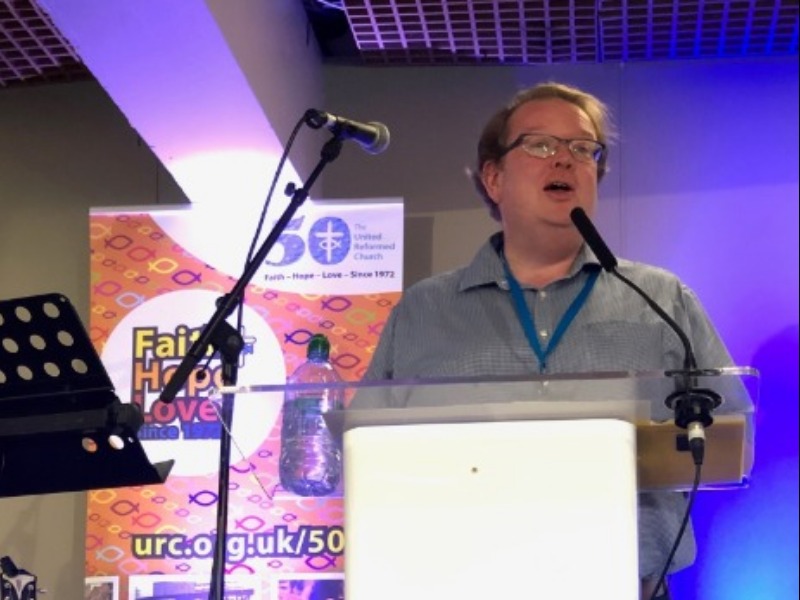The Revd Dr John Bradbury, the United Reformed Church (URC) General Secretary, spoke to the URC’s Ministers’ Gathering on Monday afternoon, in a talk entitled: ‘The URC at 50: Maturing nicely or mid-life crisis?’
Our world, he said, was turned upside down by the Covid pandemic – embracing new technology, restrictions on funerals, different ways of staying connected. New worshipping communities and ways of reaching people emerged, international links were strengthened.
“But we are tired,” he said. “My goodness, we’re really tired. And we still don’t know what this pandemic has done to us.” Experiences have varied enormously, he said. Some are excited, some ground down, some traumatised.
Although our situation does not compare to what our brothers sisters elsewhere in the world face, said Dr Bradbury, this is the most challenging time for the western Church since the Reformation. The rapid changes we were going through were brought into focus and intensified by the pandemic. Some churches didn’t survive. Many of us are running a hospice ministry, he said, which is tough and draining. A third of any congregation may not yet have returned; how worried should we be about that? We are surrounded by a culture of disinterest in organised religion; and yet young people pray more than in previous generations.
Funerals for the wider community were, ten years ago a mainstay of evangelism, said Dr Bradbury, but they have disappeared from churches. Union is no longer the ecumenical game in town. And yet the URC is still having an impact, through JPIT, through ecumenical instruments, in the public square and in the world Church.
These are the matters that the Church Life Review Group has been formed to look at.
Meeting a couple of weeks ago, the group is agreed, “One last programme or mission strategy will not sort us out.” Instead, said Dr Bradbury, we need to tend the vineyard.
One area of change that that must involve, he said, is deployment. Ministers are spread evermore thinly – soon in the URC there will be at average of seven congregations per minister. ‘Too many of us wonder if we can make it to retirement at the rate we’re going. Too many of us wonder if our calling to ministry is being fulfilled in what we’re doing.’
“We have no immediate magic solutions,” said Dr Bradbury, but the group did sees ways forward. There is work we can do that will be free congregations and ministers from some of the burden of compliance. We believe in this stuff, he said – safeguarding, health and safety, charity regulations – but we often feel we will be overwhelmed, and it takes a vast amount of time away from other things.
Another helpful prospect, he said, is that the thinktank Theos is doing qualitative research for the URC – conversations about what works and what does not, not simply questionnaires. They are talking to a representative set of local churches asking them what flourishing would look like for them and how can it be fostered.
Another point to be considered, he said, is that, ironically, church closures have released financial resources, increasing synod funds from £150m to £200m. That is in addition to what local churches are sitting on, ‘for a rainy day’. It is raining, said Dr Bradbury.
As ministers, he said, we see good deaths and less good deaths. A congregation has a good death when members feel their ministry is completed and has led to new life elsewhere. This is like the way Christ set his face to death, didn’t avoid it, but prepared for it, and went through death to resurrection. Most of the URC’s money is the result of deaths of congregations. ‘Do we build ever bigger barns,’ he asked, ‘or believe that money released can fund flourishing work elsewhere?’
Each year, 60% of our budget is spent by General Assembly and 40% by synods. That means that 14 separate bodies are spending, and it is very hard to get global picture of what we’re spending and what wealth we have. Where our money is, said Dr Bradbury, our heart is. When we find out where it is, we may need to do some soul-searching to decide whether that is where we want it to be.
The Church Life Review Group is bringing to this year’s General Assembly (for discussion, rather than immediate voting) proposals for a radical overhaul of the central committee structure. It also proposes that the URC become more proactive in attending to churches where life as it is has become unsustainable.
“There are some very real possibilities for flourishing,” said Dr Bradbury. “There are things we need to face; and facing them is a profound act of hope.”
He concluded with a warm tribute to the work of the URC’s ministers, saying: “There is no greater gift to God’s church than ministry. There is no higher calling than to be a minister of the gospel. The church owes you all a huge debt of gratitude.”

